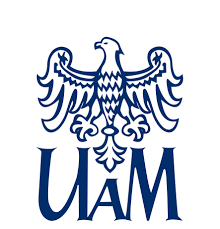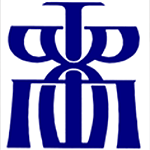|
|
European Anthropological Association
|
 |
|
 |
|
 |
 |
|
|
Reports on recent Congresses and Meetings
|
|
|
|
|
|
| |
|
|
| |
•
EAA
Summer School of Biological Anthropology
- Poznan, July 12-22, 2017
• 20th
International Congress of EAA
- Zagreb, Croatia, August 24-28, 2016
• 19th
International Congress of EAA - Moscow, Russia, 25-29 August,
2014
•
18th International Congress of EAA
- Ankara, Turkey, 3-6 September, 2012
• ICEPT 2 - Tuberculosis Evolution
Meeting - Szeged, Hungary, 22-25 March,
2012
|
| |
|
EAA Summer School of Biological Anthropology
Collegium Biologicum, Adam Mickiewicz University, Poznan, Poland
July 12-22, 2017 |
|
| |
Summer School of Biological Anthropology (SSBA) was one of the many organized
in the European academic centres this summer (please visit http://www.summerschoolsineurope.eu
where you can find info about our school). It was the second time in the
history of the European Anthropological Association that young people
spent part of their summer holidays working intensively. The topic of
this summer school was Human Growth and Nutrition and their Applications
to Health and it aimed to provide a deeper insight into the complex relation
between nutrition, physical growth and health and nutrition-related health
problems, evolutionary and developmental origins of disease and to acquire
by participants new skills for solving analytical problems associated
with the assessment of health in community.
The SSBA2017 was organized jointly by the European Anthropological Association
and the Faculty of Biology, Adam Mickiewicz University (AMU) in Poznan,
Poland. This ten-day course was held in Collegium Biologicum, AMU, Poznan,
July 12 to 22. Of 22 registered participants, 18 attended the course.
They came from Bulgaria, Hungary, Italy, Poland, Russia, Turkey and represented
the graduate, doctoral and early postdoctoral levels. The sex ratio was
extremely female biased as only one man attended the school. Professor
Barry Bogin, professor Noel Cameron and dr. Ines Varela-Silva gave very
stimulating lectures on school subjects. Professor C.G. Nicholas Mascie-Taylor
taught intensively biostatistics, a useful tool in epidemiology. On Sunday
16th, participants could enjoy a half-day cultural programme during which
they could visit historical places telling the history of the state of
Poland and the city of Poznan. They could also taste local cuisine specialities.
Participants went home after receiving 3 ECTS school completion certificates
but it is hoped that the SSBA2017 network will survive for much longer
supporting the European Anthropological Association activities.
from Professor Maria Kaczmarek
School Leader

At the beginning…

Course in Biostatistics

"Family" photo during city tour

Finis coronat opus…
|
|
| |
|
|
|
| |
|
20TH CONGRESS OF THE EAA
Institute for Anthropological Research, Zagreb, Croatia
24-28 August, 2016 |
|
| |
The 20th Congress of the European Anthropological
Association was held in Zagreb, Croatia, from August 24th to August
28th, 2016. The congress was opened by dr. Sasa Missoni, the director
of the Institute for Anthropological Research and the President of the
Congress, Professor Pavao Rudan, General Secretary of the Croatian Academy
of Sciences and Arts and the Honourable President of the Congress, Professor
Zvonko Kusic, President of the Croatian Academy of Sciences and Arts,
Professor Nicholas Mascie Taylor, President of the European Anthropological
Association, and Professor Zeljko Reiner, President of the Croatian
Parliament and delegates were also welcomed on behalf of the University.
It was particularly important that our 20th anniversary congress was
organized in Zagreb, since the foundation of the European Anthropological
Association was declared in this city in 1976 and the 1st EAA Congress
(1977) was also held in Zagreb. The EAA Council and Board awarded Prof.
Pavao Rudan, the former director of the Croatian Institute for Anthropological
Research, the General Secretary of the Croatian Academy of Sciences
and Arts, Honorary Membership of the Association to acknowledge his
remarkable role and activity in the life of the EAA (inter alia he is
one of the founder fathers of the EAA, he was one of the EAA presidents,
vice-presidents and secretaries and EAA congress organizers).
The 20th EAA Congress was organized by the Institute for Anthropological
Research in Zagreb under the leadership of Prof. Sasa Missoni. Altogether
169 participants, (including 37 students), presented the results of
their latest research at the congress. The participants came from 26
countries, mostly from Europe, but a number of participants came from
non-European countries as well. The oral and poster presentations were
grouped into the following sections: Anthropological Archaeology, Applied
Anthropology, Growth and Development, Human Diversity, Miscellaneous,
Human Evolution, Humans and Environment, Molecular Anthropology, Physiological
Anthropology sections. The plenary lectures of the congress were given
by the following well-known professors:
•
Prof. Noel Cameron (Loughborough, UK): Cultural cues for research priorities
in anthropology.
•
Prof. Igor Rudan (Edinburgh, UK): Measuring ideas: The CHNRI method.
•
Prof. Struan Grant (Struan Grant, PA, USA): GWAS only finds signals;
3D genomics finds the genes.
•
Prof. Gordan Lauc (Zagreb, Croatia): Age-related changes in the IgG
glycome: Biomarkers or drivers of health deterioration.
•
Prof. Svante Paabo (Leipzig, Germany): Of Neanderthals, Denisovans and
modern humans.
•
Prof. Damir Marjanovic (Sarajevo, Bosnia and Herzegovina): Challenges
in the molecular-genetics identification of the human remains.
•
Prof. Hermanussen Michael (Altenhof, Germany): As tall as my peers -
the community effect on height.
The EAA Council awarded the best student oral and poster presentations.
The pre-congress student award for oral presentation was given to Ms
Violeta Bartuskiene (Vilnius, Lithuania), while the best student awards
were awarded to Ms Veronika Kovacova (Brno, Czech Republic), Ms Sanni
Oversti (Helsinki, Finnland) and Ms Sara Varano (Rome, Italy).
The new EAA Council (2016-2018) held its first meeting during the congress
as well. The new EAA Board (2016-2018) was elected before the congress
by the members of the new Council, and the EAA Board also held its first
meeting before the General Assembly of the Association. Both, the list
of Council and Board members can be seen at http://eaa.elte.hu/administration_council.html,
http://eaa.elte.hu/administration_board.html.
The General Assembly of the Association discussed and accepted the corrections
of the EAA regulations suggested by the EAA Board and Council, i.e.
changes to membership fees, the dates of EAA Council and Board elections,
the procedures by which the EAA Council and Board will be elected from
2018.
The most important information on the next EAA Congress (Odense, Denmark,
22-25 August, 2018) was introduced by Prof. Jesper Boldsen during the
EAA meetings. It was notified that the 2020 congress will held in Vilnius.
Lithuania under the auspices of Prof. Janina Tutkuviene. The Summer
school (Poznan, Poland, July, 2017, topic: Human growth and nutrition
and their applications to health; applied statistical analyses) was
also announced during the General Assembly by Prof. Maria Kaczmarek.
From the very beginning, the Zagreb meeting was able to provide us with
a very pleasant and congenial atmosphere. In such an excellent atmosphere
both the scientific and social activities were very effective and fruitful
for all of us.
We would like to extend our profound gratitude
to all those involved in organizing the 20th EAA Congress in Zagreb!
from Annamaria Zsakai
|
|
| |
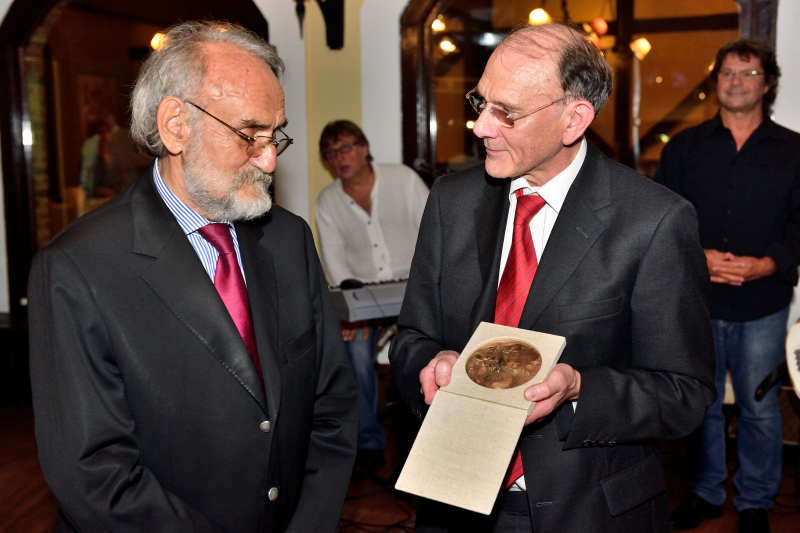 Professor Pavao Rudan and Professor Nicholas
Mascie-Taylor
Professor Pavao Rudan and Professor Nicholas
Mascie-Taylor
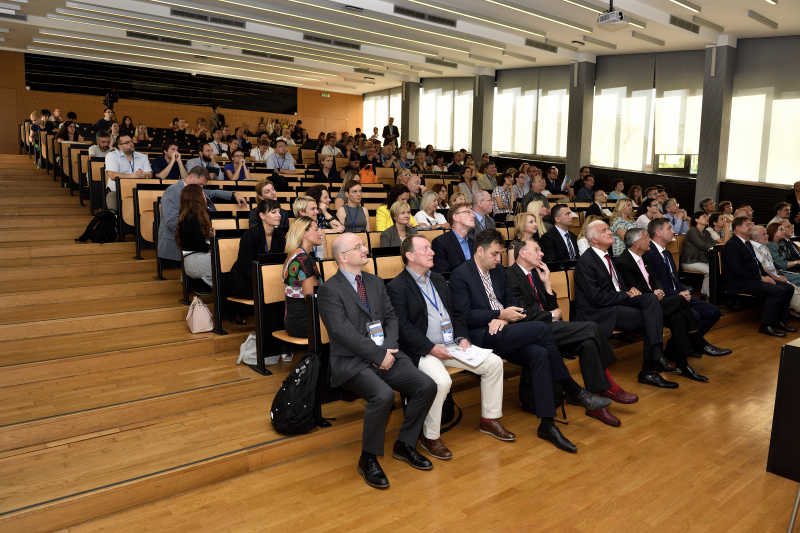
|
|
| |
|
|
|
| |
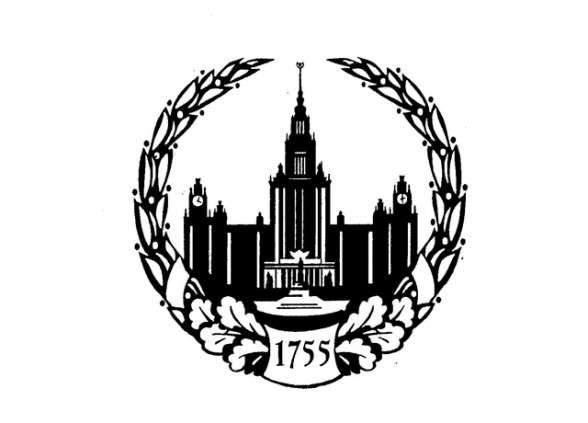 |
19TH CONGRESS OF THE EAA
Lomonosov State University, Moscow, Russia
25-29 August, 2014 |
|
| |
The 19th Congress of the European Anthropological
Association was held in Moscow between the 26th and 29th of August,
2014. The President of the Local Organizing Committee, Professor Elena
Godina and her team made very great efforts to provide perfect conditions
for this international meeting, to bring together leading academics,
research scientists as well as graduate and postgraduate students from
around the world from many subfields of physical anthropology. The Congress
gathered over 200 participants from over 20 countries and attracted
over 180 paper submissions.
The plenary lectures, the scientific sections of oral and poster presentations
gathered around the theme of the Congress (that is also the official
motto of the European Union): "Unity in diversity". Several
prominent keynote speakers of the main fields of physical anthropology
were in attendance, including:
Prof. Igor Ovchinnikov (Grand Forks, USA): Mitochondrial pseudogenes,
gene flow among African hominins, and Homo heidelbergensis;
Prof. Alexander Kozintsev (St. Petersburg, Russia): Craniometry
of the Bronze Age steppe populations of southern Russia and Ukraine;
Prof. Barry Bogin (Loughborough, Great Britain): Humans are not
cooperative breeders but practice biocultural reproduction;
Prof. Gregory Livshits (Tel Aviv, Israel): Genetics, genomics
and metabolomics of human body composition;
Prof. Nicholas Mascie-Taylor (Cambridge, Great Britain): Epidemiological
and Nutrition transition: the double burden of malnutrition;
Prof. Michael Hermanussen (Aschauhof, Germany): Global growth
charts: new concepts of generating national and regional references
for height, weight, and BMI from 0-18 years.
The congress covered a wide range of topics, the researchers could present
their newest results in the following scientific sections: "Molecular
anthropology - New Advances", "Physiological Anthropology",
"Human Diversity", "Humans and Environment", "Human
evolution", Applied Anthropology", "Growth and Development",
Ageing and Senescence".
The Council
of the European Anthropological Association was formed before the
Congress in August 2014, and had a meeting during the Congress (report
on the Council meeting). At the closing session of the Congress,
at the General Assembly of the Association (report
on the General Assembly) the new President, Prof. Nicholas Mascie-Taylor
and the new Board
of the EAA were announced.
The Awards of the Best Students Poster Presentation were also announced
at the closing ceremony. The winners of the Awards were:
•
Ozdemir Aysegul from Ankara University, Turkey (Evaluation of Arm Anthropometry
and nutrition in Turkish Preschool children);
•
Maria Eugenia Ibanez from University of the Basque Country, Spain (Body
image satisfaction in relation to body composition in a young population
from the Basque Country, Spain);
•
Annamaria Posa from Szeged University, Hungary (Molecular and morphological
case of Pott's disease from the Arpadian-Era). Congratulations to all
of them!
As a closing event a symbolic baton was handed to the Croatian team
(from Institute of Anthropological Research), because the next EAA Congress
will be held in Zagreb in 2016.
We found the congress to be very informative and beneficial, and to
our great pleasure there were ample opportunities to network during
the meal breaks and social events during the Congress. The 19th EAA
Congress also created an opportunity for us, the guests of Moscow, to
experience the rich culture and history of the city.
We would like to extend a heart-felt thank to all members of the Organizing
Committee, especially to Prof. Elena Godina for their enormous work.
We would like to express our sincere gratitude to them for organizing
such a successful event of the European Anthropological Association.
from Annamaria Zsakai
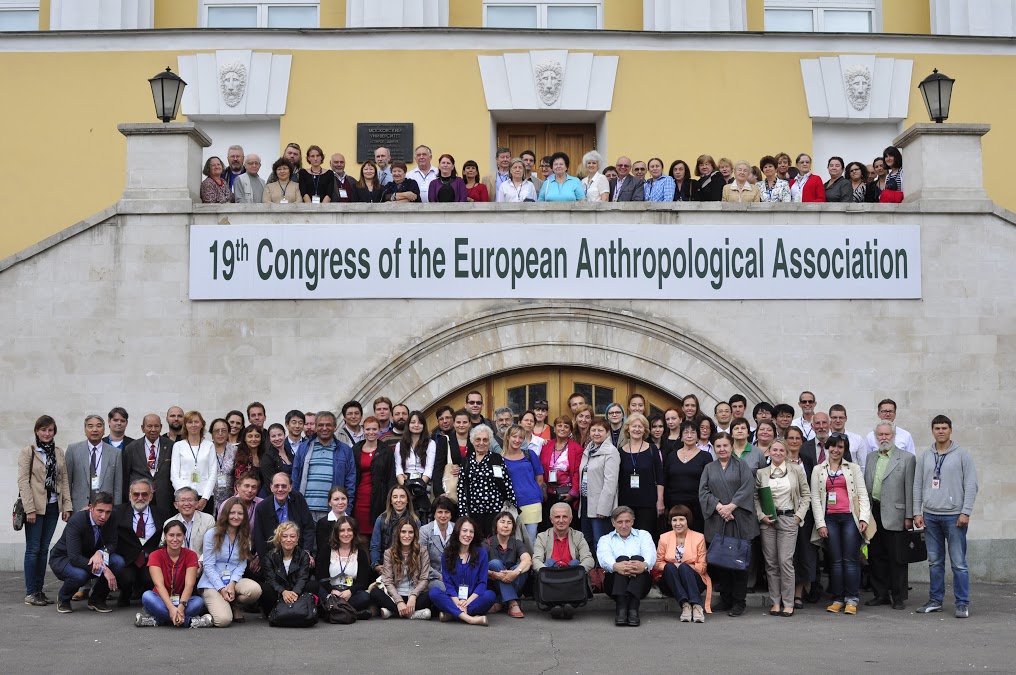
|
|
| |
|
|
|
| |
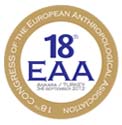 |
18TH CONGRESS OF THE EAA
University of Ankara, Ankara, Turkey
3-6 September, 2012 |
|
| |
The last, 18th Congress of European Anthropological
Association was held in Ankara (Turkey) from September 3d to 6th,
2012. It was arranged with the support of the Ankara University, and
the president of the Congress was the University Vice-rector and Professor
of Anthropology Department Erksin Gülec, one of the leading Turkish
anthropologists, well-know for her palaeoanthropological research. Among
other members of the National Organizing Committee were Drs. Basak Koca
Özer, Ismail Özer and Mehmet Sagir, also from Ankara university
staff.
In accordance with the main subject of the Congress - "Human Evolution
and Dispersals", three out of five plenary lectures were dealing
with different aspects of human evolution. Prof. David W. Frayer (Department
of Anthropology, University of Kansas, USA) talked about the emergence
of language in Prehistoric Europe with the special emphasis on Neanderthals
speech. New methods in paleoepidemiological reconstructions of health
in past communities were the subject of the talk by Prof. Jesper Lier
Boldsen (Department of Anthropology, Institute of Forensic Medicine,
University of Southern Denmark, Denmark). Prof. Jean-Jacques Hublin
from the Department of Human Evolution, Max Planck Institute for Evolutionary
Anthropology, Germany, has lectured on the first modern peopling of
Western Eurasia, including such recent and disputable findings from
the area, as the one from Denisov cave.
In two other plenary lectures the speakers somehow reconsidered their
life-time careers in the light of new methods and visions. Prof. Doug
Ubelaker (Smithsonian Institution Department of Anthropology, The George
Washington University, USA) "revisited" his former forensic
case studies with new contemporary perspectives. Prof. Nicholas Mascie-Taylor
(Department of Biological Anthropology, University of Cambridge, Great
Britain), the former EAA president (2008-2012), in his lecture "From
Genes to Latrines" talked about the developments of his studies
from population genetics to different aspects of medical anthropology.
Apart from the plenary lectures, the scientific program of the Congress
included several sessions with oral presentations (called "Free
Communications") dealing with traditional anthropological subjects:
"Human Evolution and Dispersals", "Human Health (palaeopathology)",
"Human Skeletal Biology", "Human Genetics" , "Human
Biology"? "Public Health, Determinants, Measurements and Trends",
"Growth, Maturation and Aging", "Nutrition and Global
Trends". Two sessions were dedicated to more diverse anthropological
issues: to ethical and cultural aspects of anthropological research
and to zooarcheological studies reflecting subsistence strategies of
ancient populations.
There were also two poster sessions (111 posters displayed) more or
less structured along the lines of the above mentioned topics.
About 120 participants from 34 countries attended the Ankara Congress.
They were not only from Europe but also from Africa, Asia and both Americas.
The most numerous delegations were from the hosting country (Turkey)
- 27, Russia (25) and Poland (16), followed by Iraq (9), Czech Republic
(8) and Japan (8).
At the closing session of the meeting a new President (Dr. Esther Rebato,
Spain) and a new board of the EAA were announced, students prizes for
the best oral presentation and the best poster were given, honorary
EAA memberships were presented to Profs. Eva Bodzsar (Hungary) and Roland
Hauspie (Belgium) for their long-standing achievements in EAA affairs.
Finally a symbolic baton was handed to the Russian EAA members because
Moscow was chosen as the host for the next EAA-2014 Congress.
The quality of the scientific program of the Ankara Congress was excellent
but social and cultural events were equally good. The hosts were entertaining
their guests with tours around the capital of Turkey, arranged wonderful
cocktail and dinner receptions and took those who wanted to the post-congress
tour to the Cappadocia fantastic area.
We are very grateful to the organizers for this very friendly and warm
international event and we are looking forward to meet everybody in
Moscow, Russia, for the 19th Congress of the EAA in 2014.
Acknowledgement: The author is grateful
to Dr. Basak Koca Özer for the information about the Congress individual
and countries participation.
from Prof. Elena Godina

Professor Erksin Gülec, the President
of the Organizing Committee (the Opening Ceremony)
|
|
| |
|
|
|
| |
|
|
| |
|
|
|
| |
|
|
|
| |
|
|
|
| |
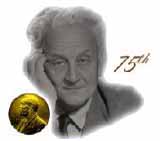 |
ICEPT 2 -
TUBERCULOSIS EVOLUTION Meeting
held within the conference series celebrating the
75th Anniversary of Albert
Szent-Györgyi's Nobel Prize
University of Szeged, Szeged, Hungary
22-25 March, 2012
|
|
| |
The year 2012 is an exceptional anniversary in the life of Szeged and
its university. Former rector and professor of the university, Albert
Szent-Györgyi published his discovery in 1932 that won him Nobel
Prize 75 years ago in 1937. The University of Szeged celebrated this
anniversary with a large scale series of events between the 22nd and
25th of March, 2012.
Plenary lectures of 9 Nobel Prize laureates (Medicine and Physiology:
Andrew W. Schally (1977), Bert Sakmann (1991), Eric Wieschaus (1995),
Peter C. Doherty (1996), Tim Hunt (2001); Chemistry: Ada E. Yonath (2009),
Aaron Ciechanover (2004), John E. Walker (1997), Robert Huber (1988))
and other leading specialists made prominent contributions to the main
scientific program in the Congress Center of the university. The program
later continued with 6 parallel scientific conferences (cardiology,
gastroenterology, immunology, molecular biology, genetics and tuberculosis)
in 3 venues. Altogether 1429 participants from 32 countries registered
to the conference series.
The Tuberculosis Evolution Meeting titled "ICEPT2 - The Past &
Present of Tuberculosis: a multidisciplinary overview on the origin
and evolution of TB" joined the conference series in French and
Hungarian co-organization. Main organizers of the meeting, György
Pálfi (Szeged) and Olivier Dutour (Paris/Bordeaux) launched a
series of interdisciplinary conferences on the paleopathology and evolution
of infectious diseases in the early 90's. Within the framework of this
initiative the predecessor of TB Evolution Meeting titled "ICEPT
- International Congress on the Evolution and Palaeoepidemiology of
Tuberculosis" was organized in Hungary (Budapest-Szeged) in 1997.
The international organizing committee of "ICEPT2" included
acclaimed researchers of the topic from Hungary and abroad (Olivier
Dutour - Paris/Bordeaux, György Pálfi - Szeged, András
Palkó - Szeged, Pascale Perrin - Montpellier, Christophe Sola
- Paris, Attila Somfay - Szeged and Albert Zink - Bolzano). Their work
was supported by the local organizing committee (Zsolt Bereczki - Szeged,
Hajnalka Dürgõ - Szeged, Muriel Masson - Edinburgh/Szeged,
Erika Molnár - Szeged, László Paja - Szeged, György
Pálfi - Szeged, Ildikó Pap - Budapest, Zoltán Pintér-
Szeged, Annamária Pósa - Szeged, Ágnes Mira Szabó
- Szeged, Renee Willmon - London, Ontario/ Bordeaux).
The meeting was opened in Hotel Tisza in the afternoon of the 23rd of
March in Szeged. 102 scholars from 4 continents participated the event.
The program of the opening day of the conference contained two highly
interdisciplinary sessions where researchers of molecular genetics,
microbiology, paleomicrobiology and paleopathology shared their knowledge
on the evolution of TB and its pathogens. Results of the search for
mycobacterial DNA remains in the oldest known TB case (9000 BP, Mark
Spigelman), TB evolution hypotheses based on investigations of mummies
and skeletal remains (Albert Zink) and modern genetical theories of
the formation of TB bacteria (Roland Brosch) were presented among many
other topics.
The ICEPT2 dedicated two special sessions to the World TB Day on the
24th March. In his opening plenary lecture Stewart T. Cole, the world-renowned
researcher of TB bacteria spoke about the history of Mycobacterium studies
and its future perspectives. In the plenary lecture Zsuzsanna Jakab,
Director of the World Health Organization's Regional Office for Europe
introduced the audience to the possibilities to fight drug resistant
strains of bacteria on the international level. Helen Donoghue analyzed
evolutionary questions of TB and leprosy in the light of the achievements
of paleomicrobiology.
The last day of the international conference on TB evolution started
and finished with special paleopathology sessions, putting the sessions
of modern genetics and diagnostics in a frame on in the program. Several
extraordinary findings from Hungary were presented on this day, including
the prominently high prevalence of TB infection in the Vác mummy
collection (Ildikó Pap) and symptoms of mycobacterial infection
on Neolithic and Neanderthal (at least 30 000 years BP) human remains
(György Pálfi).
In the session for mycobacterium evolution Prof. Roland Brosch, leading
investigator at the Pasteur Institute Paris, one of the most outstanding
researchers in the evolutionary genetics of TB presented the newest
results concerning the evolution of TB bacteria.
Among many other talks in the afternoon David Minnikin professor of
chemistry from Great Britain introduced new chemical identification
methods for remains of several millennia old TB bacteria, and Prof.
Olivier Dutour from Bordeaux gave a lecture on possible applications
the state-of-the-art medical imaging techniques and 3D reconstruction
methods in paleopathology. The meeting was closed with a special paleoepidemiological
talk from Joël Blondiaux who spoke about the impact of TB on human
populations and questions of survival.
Beside the rich scientific program, the conference series offered several
cultural events as well. After the sessions quality social programs
entertained the participants including a folk music and dance show and
organ and piano concerts of famous Hungarian musicians. The program
of this grandiose event of importance in the history of science was
closed by a gala dinner.
from Dr Erika Molnar and Dr Zsolt Bereczki
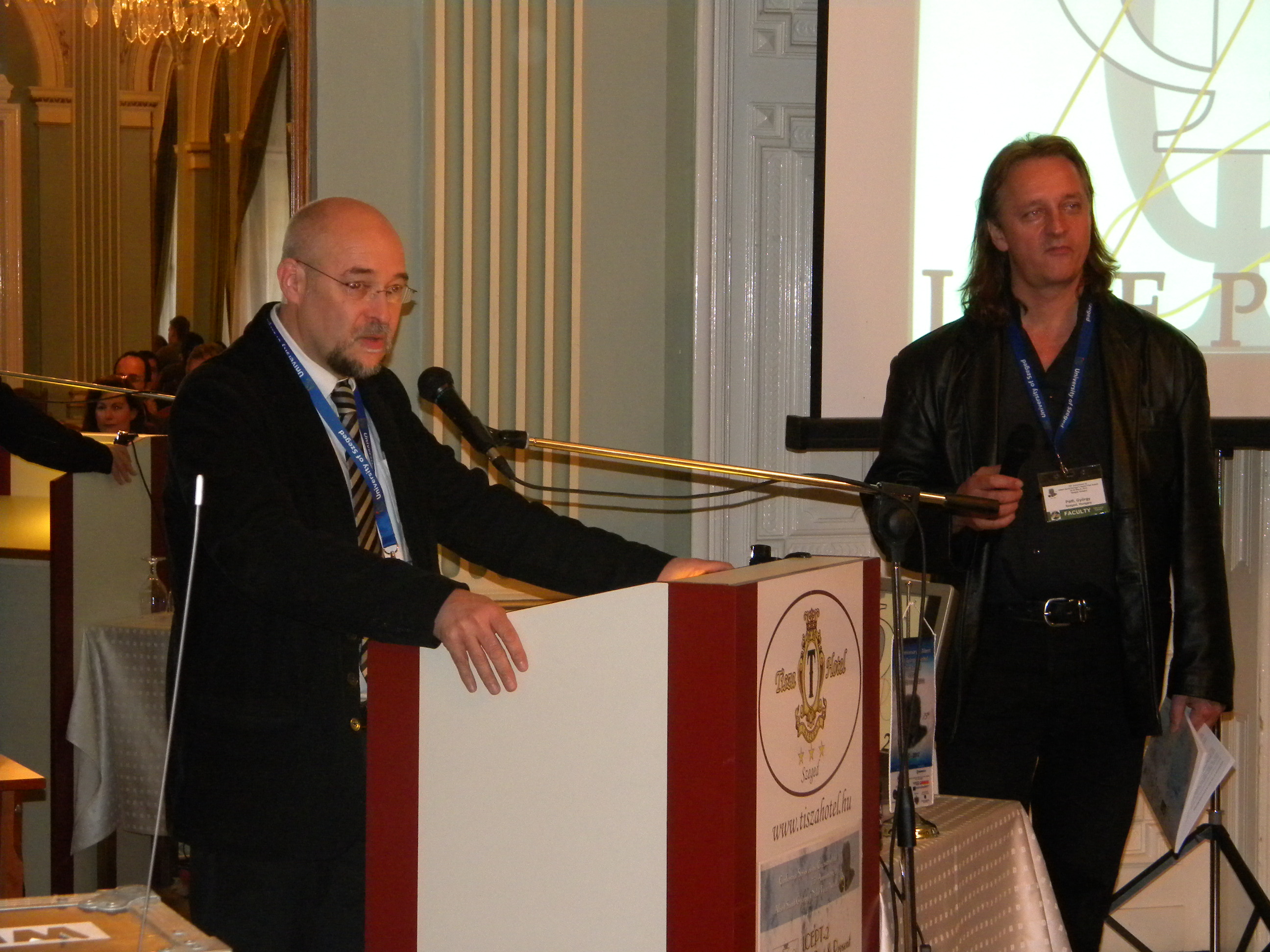
Olivier Dutour and György Pálfi - main
organizers of the ICEPT2 meeting

Participants of the ICEPT2 meeting
|
|
| |
|
|
|
|
|
| |
|
|
|
|
|
| |
|
|
|
|
| |
|
|
 |
 |
 |
|
|
|

|
|

|





